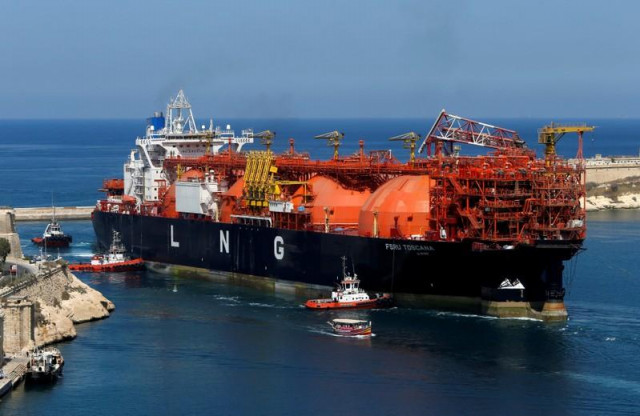RLNG consumers to pay high tolling fee
Fee will come down if hurdles to import by private sector are removed

Representational image. PHOTO: REUTERS
Officials say this is an ideal time for the importing countries to aggressively enter into oil and gas import contracts in a bid to save foreign exchange but Pakistani consumers may be denied the relief as the opportunity may be missed.
The Pakistan Tehreek-e-Insaf (PTI) government had allowed the private sector to import and market LNG in July last year. Third-party access rules were also notified that permitted the private sector to pump gas into the pipeline system of public gas companies against a tolling fee.
However, this mechanism has not yet been implemented and not a single private LNG ship has docked in the country.
OGRA hikes RLNG prices by up to 6.6%
Officials say the private sector like compressed natural gas (CNG) outlets, fertiliser and textile producers were ready to import but bureaucratic hurdles stood in the way of implementing the government’s decision.
At present, Pakistan has two LNG terminals with a handling capacity of over 1.2 billion cubic feet per day (bcfd) dedicated to the government. However, in February, public sector companies imported only one cargo despite the dedicated capacity for six cargoes.
The low lifting of gas by public sector companies like Sui Northern Gas Pipelines (SNGPL) was going to cost LNG consumers $2.28 per million British thermal units (mmbtu), which may be the highest terminal tolling fee in the region, said officials, adding that LNG could be available but SNGPL was not ready to lift due to the power producers’ reluctance to take supplies.
Meanwhile, the actual re-gasification rate is $0.42 but the consumers are being charged $2.28 per mmbtu, higher by $1.86.
Officials said no one was getting the benefit of lower LNG prices and the cost was going up due to monopoly of the government, inefficient companies and corruption. Special Assistant to Prime Minister on Petroleum Nadeem Babar had announced many a time that the private sector would take the LNG business forward and the government would not increase its footprint in the industry but there was no implementation of the plan.
Pakistan LNG Terminal Limited (PLTL) was set to sign a borrowing and lending agreement to utilise the idle capacity of the second LNG terminal. However, so far PLTL has not been able to sign the deal.
In addition to the dedicated terminal capacity of 600 million cubic feet per day (mmcfd) for the government, the second LNG terminal had an additional capacity of 150mmcfd which, if utilised, will reduce the tolling fee further.
SNGPL had to identify the idle pipeline capacity for allocation to the private sector, however, the company did not identify the actual capacity and was unable to sign a capacity allocation agreement with the private sector.
According to experts, LNG prices have dropped below $2 per mmbtu and the entry of private sector can help bring gas at attractive prices.
The previous government had inked LNG deals at higher prices and the Oil and Gas Regulatory Authority (Ogra) recently notified LNG price of up to $11 per mmbtu for the consumers.
Experts say government companies should implement the mechanism approved by the cabinet and allow the private sector LNG imports. It would help reduce the weightage average price of LNG due to additional imports at sharply lower prices, they added.
When contacted, the Petroleum Division spokesperson did not respond to the request for comment.
OGRA notifies reductions in price of RLNG for January
However, an SNGPL official stressed that the government should cap the current LNG price and import cheaper gas that would reduce the overall LNG cost in the country. The real issue was that Pakistan State Oil (PSO) and Pakistan LNG Limited (PLL) were importing expensive LNG due to the contracts signed during the tenure of previous Pakistan Muslim League-Nawaz (PML-N) government, he said. Therefore, the companies felt if the private sector was allowed, who would consume the expensive gas.
The official said the best choice left with the government was that it should take up the issue of revision in gas prices with Qatar. Otherwise, there would be no consumers, except for domestic ones, to lift the expensive gas.
Published in The Express Tribune, March 17th, 2020.
Like Business on Facebook, follow @TribuneBiz on Twitter to stay informed and join in the conversation.


















COMMENTS
Comments are moderated and generally will be posted if they are on-topic and not abusive.
For more information, please see our Comments FAQ